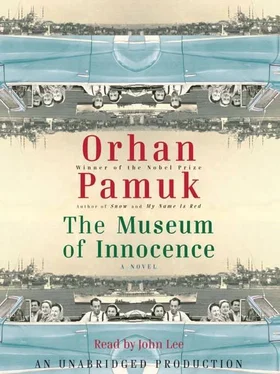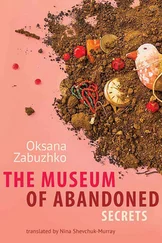“Oh dear, I hope I didn’t miss the plane crash, too,” I said once.
“The plane crash was yesterday, Cousin Kemal,” Füsun replied.
In the winter, I could say things like “How cold it is!” or “Are we having lentil soup?” as I was taking off my coat. After February 1977, when the installation of a buzzer allowed them to admit me without coming downstairs, I had to make my opening gambit as I was walking into the apartment, and that was harder. If Aunt Nesibe saw me struggling to find a way into the domestic routine, she’d draw me in at once: “Oh, Kemal Bey, don’t just stand there, sit right down, before your pastry gets cold;” if not she’d make a more typical reference to current events: “The man shot up an entire coffeehouse and now he’s bragging about it.”
I would frown and take my seat straightaway. My presents also helped me with awkward first moments after my arrival. During the early years, I’d bring pistachio baklava, Füsun’s favorite, or water pastries from Latif, the renowned bakery in Nişantaşı, or hors d’oeuvres like salted bonito and taramasalata. Always handing whatever it was to Aunt Nesibe, and without much fanfare. “Oh, you shouldn’t have gone to so much trouble!” Aunt Nesibe would say. Then I would give Füsun her special present or leave it somewhere for her to find later, diverting attention by offering Aunt Nesibe a jolly reply: “I was just passing by the shop, and the pastries smelled so good I couldn’t resist!,” adding a few words of praise for whatever Nişantaşı patisserie I had visited. Then I would take my place discreetly, very much like a pupil who has come to class late, and suddenly my mood would lift. After sitting at the table for some time, I would eventually come eye to eye with Füsun. These were the sublime moments that repaid any amount of trouble I had gone to.
I treasured that moment when our eyes first met-not on first arrival, but while we were sitting down at the table-not only because it warmed my heart but because it spoke of what sort of evening lay ahead. If I saw some contentment, some tranquillity in Füsun’s expression, even if it were a frown, the rest of the evening would assume that tone. If, however, she was unhappy or uneasy and so didn’t smile, I wouldn’t smile much either; during the first months I wouldn’t under such conditions even try to make her laugh, but just sit there drawing as little attention to myself as I could.
My place at the table was between Tarık Bey and Füsun, on the side facing the television, and across from Aunt Nesibe. If he was at home, Feridun would be next to me, as would the occasional guest. At the beginning of the meal it suited Aunt Nesibe to sit with her back to the television, so that she could slip easily in and out of the kitchen, but by the middle of supper, when she had less to do, she would come to sit on my left, between me and Füsun, so that she could watch television more comfortably. For eight years I sat here elbow to elbow with Aunt Nesibe. Sometimes, when he came home late in the evening, Feridun would take a seat along the side of the table Aunt Nesibe had left vacant. And then Füsun would go to her husband’s side, and Aunt Nesibe would take her daughter’s old seat. Then it became difficult to watch television, but by then the broadcast day would be over anyway, and the television set was turned off.
When something important was on television while there was still something cooking on the stove, Aunt Nesibe would send Füsun in to check it in her place. As Füsun darted between the kitchen and the dining area, which was just next door, carrying plates and pots, she would pass right between me and the television screen. As her mother and father lost themselves in some film, or quiz show, or weather report, or the tirade by some angry general of ours who had just staged a coup, or the Balkan Wrestling Championship, or the Manisa Mastic Festival, or the ceremony marking the sixtieth anniversary of the liberation of Akşehir, I would watch my beauty pass back and forth in front of me, as though she was not, as her parents might have seen it, blocking the view, but rather was the view itself.
During my 1,593 visits to the Keskin household, I spent a good part of the evening sitting at the dinner table watching television. But I cannot so easily tally the length of individual visits. Out of shame, I would always try to convince myself that I’d gone home far earlier than I had done. It was, without doubt, when the broadcast ended that we remembered the time. The closing ceremony, watched in all the country’s coffeehouses and gambling clubs, lasted four minutes: soldiers marching in step, saluting the flag as it was raised up the pole, and the national anthem playing in the background. Considering I usually arrived at around seven o’clock, and left soon after this nightly ceremony around midnight, I suppose I must concede I spent an average of five hours at Füsun’s house on each visit, but clearly there were times when I stayed longer.
In September 1980, four years after I began my visits to the Keskin household, there was another military coup; martial law was imposed and with it ten o’clock curfews. These obliged me to leave the house at a quarter to ten, long before my heart had satisfied its hunger. During the last minutes before the curfew, as Çetin drove quickly through the dark and fast-emptying streets, the torment of insufficiency would feel as keen as that of total deprivation. I would feel the pain of not having seen enough of Füsun. Even now, all these years later, whenever I read in the papers of the military’s displeasure with the state of the nation, the evil of military coups I remember most vividly is that of rushing home denied my due ration of Füsun.
My relations with the Keskin family went through their vicissitudes over the years: the meanings of our conversations, our respective expectations and silences were forever changing shape in our minds. Of course, what never changed for me was my reason for going, which was to see Füsun, and I assumed this pleased her and her parents. But because the reason could never be spoken openly, we all had recourse to some form of euphemism. I was there as a “guest,” though this term was ambiguous and not altogether convincing in the circumstances, we collectively agreed on an alternative expression that made us less uncomfortable. I went to the Keskins’ four times a week to “sit.”
Aunt Nesibe was particularly fond of this formulation, familiar to Turkish readers, which foreign guests to our museum might not readily understand, due to its manifold applications-“to pay a visit,” “to drop by,” or “to spend some time with someone”-not to be found in the dictionary. When I left at the end of an evening, Aunt Nesibe would always bid me farewell with the same gracious words: “Come again tomorrow, Kemal Bey, and we can sit together again.”
In so saying she did not imply that we did nothing but sit at the table, of course. We would also watch television, sometimes falling silent for long stretches, and sometimes conversing amicably about this and that, as well as eating and drinking raki . During the early years, to impress upon me how welcome I was, Aunt Nesibe would make particular mention of these other activities. She would say, “Do come again tomorrow, Kemal Bey, we’re having those stuffed zucchini you love so much for supper,” or, “Tomorrow we can watch the ice-skating competition, which they’ll broadcast live.” When she said these things, I would glance at Füsun, hoping for some sign of approval, ideally a smile; if Aunt Nesibe said, “Come, we’ll sit,” and Füsun seemed to approve, I could let myself believe that there was no deceit in her words, that we were indeed gathering in the same place, as people do, to sit together. Touching in the most innocent way upon my main reason for being there-my desire to be in the same place as Füsun-the word “sit” suited me perfectly. Unlike those intellectuals who deem it a solemn duty to deride the people and who believe that the millions of people in Turkey who talked of “sitting together” every evening were congregating to do nothing, I, to the contrary, cherished the desire expressed in the words “to sit together” as a social necessity amongst those bound by family ties or friendship, or even between people with whom they feel a deep bond, though they might not understand its meaning.
Читать дальше












